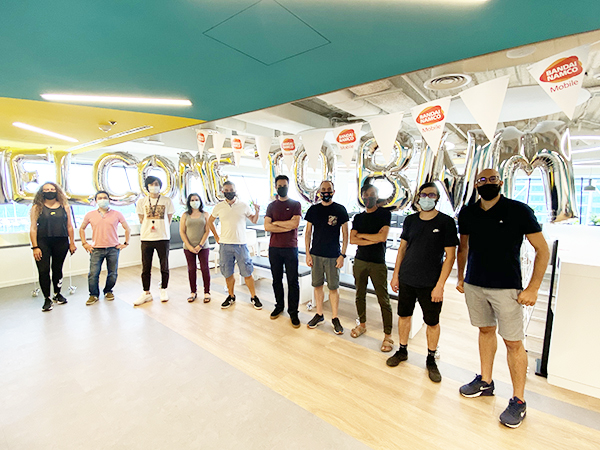Aiming to grow their share of the Western mobile gaming markets, BANDAI NAMCO Entertainment has founded BANDAI NAMCO Mobile, a brand-new company located in Barcelona. We interviewed COO Tatsuya Kubota about how the company came to be and inquired about the goals and unique structure of the new organization.
*This article was originally released in Japan on November 12, 2020.
Barcelona – An International Hub for Mobile Gaming
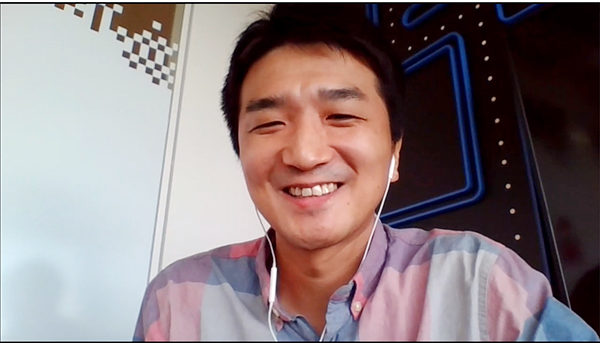
What can you tell us about the newly established BANDAI NAMCO Mobile?
Kubota: Mobile gaming today is the world’s largest market and is expected to grow to double the size over the next five years. BANDAI NAMCO Mobile was founded with a mission to bring our content to as many customers as possible in the rapidly growing western mobile gaming markets. The traditional divides between publishers and developers generally do not exist in the mobile gaming industry, since it is both entirely digital and B2C, hence making it essential to have an organization capable of developing great content and bring it straight to customers.
It is for this reason that BANDAI NAMCO Mobile has three main functional roles. The first is marketing, ensuring that customers in the region are aware of the passion creators are pouring into our games, and that creators in turn hear from those same customers. Second is game development, done locally for local markets. Third is publishing, exploring subscription services and other new business models while working with external development studios for new efforts in a variety of media formats.
If we look at marketing in particular, we can see that while we have lots of content developed in Japan that has been well-received, there are still some cultural barriers that we need to learn to overcome in order to appeal to even more customers in other regions. This is why we have western and Japanese staff eagerly working to cultivate appreciation for our content among western customers, create more local and “culturalized” marketing, and work to become experts in this area.
I imagine there were a number of locations to choose from, so can you tell us why you settled on Barcelona? Is Barcelona a hot-spot for companies in the mobile gaming industry?
Kubota: First and foremost, as digital technology changes both our lifestyles and business domains, it becomes less and less important to divide the western market along national borders, and it is increasingly more efficient to view markets based on populations of speakers of particular languages. Think of a certain famous video game influencer, for instance, who is Swedish, lives in the UK, uploads video content in English, and has over 100 million followers all around the world.
Even just looking at the US, one of the largest single-country mobile gaming markets, we see that the 100 top selling games are a pretty varied assortment of games developed in the US, Europe and Asia. Taking all of this into account, we theorized that while there might be major differences between Western and Japanese styles of communication and business practices, when targeting western markets there was no reason to choose a location based solely on the country it is in.
For us, it was important to find somewhere in the West where we could attract highly skilled international talent.
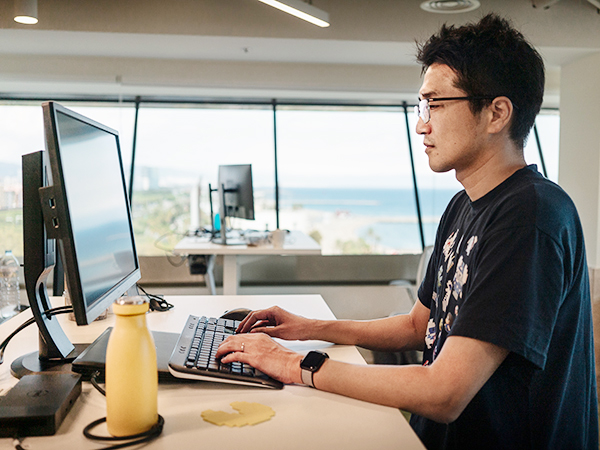
Kubota: The biggest factor in our choice was diversity. Most cities are predominantly home to local companies, but a number of foreign companies had already settled in Barcelona and the city was already home to a large community of mobile gaming talent. We felt that having staff from many different cultural backgrounds working in this diverse and international setting would serve an important role in our marketing and game development efforts which targeted all Western countries.
The city’s high QOL (Quality of Life) was another important part of our decision. The weather is warm, the sea and mountains are close by, the cost-of-living is low, and the food is fantastic. The people here are very friendly too, and they know quite a lot about Japanese anime. The city is extremely international, with nearly half the population of Barcelona being foreign-born. This means there are lots of international schools too. Since we’re in competition for talent not just in Barcelona, but throughout the West, we figured these facts would benefit our recruitment efforts. It’s apparent to us already how much of a positive impact our location is having in this regard.
Barcelona has been an area hit hard by the COVID-19 pandemic. What countermeasures has BANDAI NAMCO Mobile put in place?
Kubota: When concerns over COVID-19 really started to pick up between February and March, 2020, we were still working from our temporary office. Work-from-home was already built into our employee welfare policies at the time though, so we weren’t hit with any major impact from the pandemic. It did set back the construction works at our new office by around 4 months however, but we finally managed to open it in September 2020. Working from home and working from the office both have pros and cons based on home situations, occupation, and project progress, so I’m glad we are at a point where we can again offer our staff both options. With the pandemic still ongoing, however, we do what we can to limit the spread by avoiding the “three Cs” (closed spaces, crowded places, close-contact) and enforcing the use of masks throughout our office.
What sort of talent does BANDAI NAMCO Mobile employ?
Kubota: We currently have 30 employees, made up of 11 different nationalities, and are still recruiting more, expecting to further grow our numbers (as of April 2021). The staff here cover a wide range of fields, with people handling back office work like accounting, recruiting, and general affairs, people in marketing like performance marketing managers and data analysts, as well as development staff including game designers, developers, artists, and so on.
What sort of recruitment policies have you instituted? Can you tell us of any differences compared to Japan?
Kubota: At BANDAI NAMCO Mobile we want our staff to unleash their full productive and creative potential, so we chose a flat, non-hierarchical structure that differs from the rest of the BANDAI NAMCO Group companies. While general staff recruitment is the norm in Japan, in the West specialist and mid-career recruitment is quite common. To go into marketing, for example, you study marketing at university, get a job in a marketing position, and build your career up from there. This creates an assumption that the staff you recruit will have expertise and experience in their respective fields, inevitably making recruitment a long-term process. For instance, during the hiring process, the members of relevant teams take part in the interviews, preventing situations in which new staff gets hired by a boss without the knowledge of the team. This also allows candidates to sit among and get a sense for the people they will be working with and take that into consideration when deciding if they want to join us.

Does that mean all team members are committed to the recruitment process?
Kubota: Exactly. Throughout the recruitment process, we always ask ourselves if hiring a certain candidate will boost the strength of our team. With the flat structure we have, considering whether a candidate is someone you want to work with and learn from means that when someone does join it leads to a boost in the skills of the team and the company as a whole. You see, even though job performance and talent management abilities are two completely different matters, in organizations with pyramid-style hierarchies those who perform best typically move up the chain of command, essentially lowering productivity as ace talent gets moved away from hands-on work. In a flat organization, everyone is generally on the same level, so staff are able to spend all their time working on what they are the best at.
I’m not suggesting that a same-level structure means everyone works independently, however. The real thrill of being employed at a company comes from working on projects of a scale that would be tough for solo work, and for which teamwork is essential. We need to work hard as a group, sharing both the positive and negative things we feel about our company and colleagues, and be honest and proactive in talking about what we lack in order to achieve collective excellence. Another easier way of looking at it is by thinking of your boss as another member of your team.
Developing Ambitious, Innovative Content to Dominate the Mobile Gaming Market
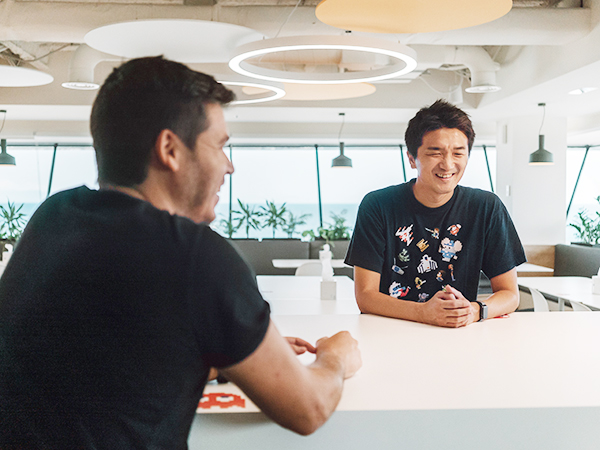
I’m sure you already have new mobile gaming projects underway. Are there any major principles for new content development you can share with us?
Kubota: One would be that we want to make our own content. Setting up a new company here in Barcelona with talented local staff provides us with an excellent opportunity to create our very own, innovative content, rather than relying on existing IPs from the BANDAI NAMCO Group.
Another has to do with the sense of scope for our games. We want to make games that will be played for years by tens or hundreds of millions of people. We want to create quality content that many of our customers can enjoy long term, rather than content which ends in only a year or two.
A third is that the company avoids asking the development team to make a specific sort of game. We entrust them with determining what genre and what content our games will have. Companies with flat structures operate under a philosophy of freedom and responsibility, so the team has the ownership of decision. This allows each individual member to think of themselves as owner of the project, encouraging self-motivation, self-discipline, and self-improvement, and fostering passion, creativity and innovation which we hope in turn will make their way into our games.
For instance, mobile game projects often get canceled if a test launch isn’t well received, but the team is the one to decide whether or not something should be cancelled instead. We put together an extraordinarily talented team, and they know better than I do whether something is worth pouring their valuable time into, and whether or not what they are making offers value to our customers.
Other than these three principles, the team is free to work as they please. I feel that our own mission as a company is to continue shaping our organization into an environment where the team can perform at their best.
Mobile gaming is still considered a new frontier in the gaming industry. What is most exciting about development in this area?
Kubota: The scale of the user base. Smartphones have greatly outpaced the reach of all current gaming consoles and PCs, making it so that reaching even 100 million downloads is not rare at all. The biggest draw of mobile gaming is the immense scale you can achieve. It’s an intensely competitive market, of course, with hundreds of new games released every day, but I feel it’s also one with incredible potential.
BANDAI NAMCO Mobile – Creating a New Gaming Future
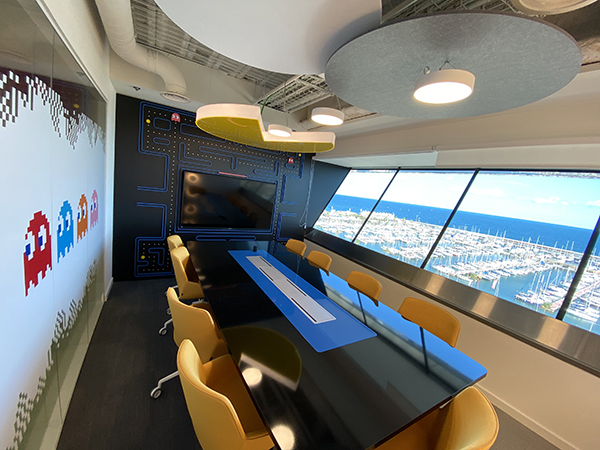
BANDAI NAMCO Mobile is working in Barcelona to develop original content made in the West while simultaneously striving to market Japanese content for the Western market. Keep an eye out for the company as it works in cooperation with the rest of the BANDAI NAMCO Group both in Japan and around the world in efforts to expand upon the very possibilities of mobile gaming.
▼Check out our video below for more information! (*Updated: 14th September 2021)
You can read more about BANDAI NAMCO Mobile:
Everyday Life Filled with International Flair, at BANDAI NAMCO Mobile in Barcelona
Haruki Sakagami
Content producer. Writer. Photographer. Active in media and marketing for a wide range of fields including hardware, business, interior design, culture, and tech.



